Share with your family and friends! Click on the audio or video selections to listen to performances from this year by our outstanding senior musicians!
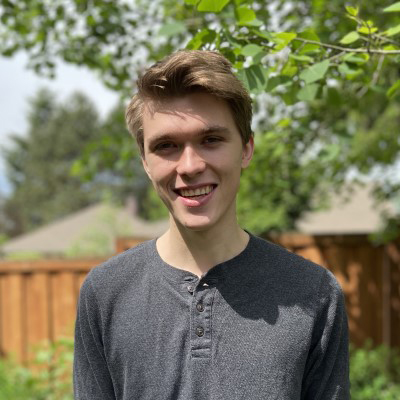
Thomas Carpenter
BM in Vocal Performance. Longview, WATitle: Highlights from Im Wald by Thomas Carpenter (b. 1998), Performed by Anika Vanderwal, mezzo-soprano, and Brenda Winberg, piano
During my three years at Willamette I have had many incredible experiences and valuable opportunities. Last summer I had the opportunity to compose my own song cycle titled Im Wald thanks to the Carson Grant. This brief selection contains two songs, "Gesicht" and "Der Wildbach." These two songs are complex, yet refined. They allow the listener to be enveloped in another world -- the world of Im Wald. With this, I would like to wholeheartedly thank everyone who stuck with me and made this journey the best of my life. Thank you.
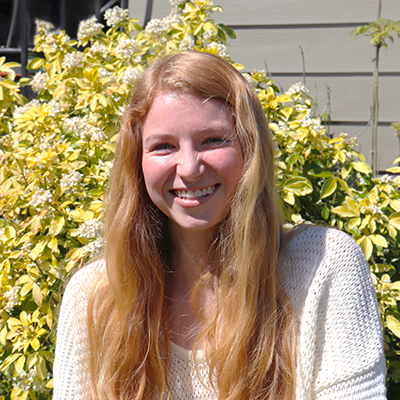
Lauren Collar
BA Environmental Science. San Jose, CATitle: October 1st 2019 Convo. I performed "Canzone" by Samuel Barber (1910 - 1981), Lauren Collar, flute, Crystal Zimmerman, piano.
I want to thank the Willamette University music department and especially Dr. Stanek for fostering my growth through the past 4 years. I have greatly enjoyed my experiences in the University Chamber Orchestra, University Wind Ensemble, Pro Musica Chamber Orchestra, and Woodwind Chamber Ensemble. Thank you for the wonderful musical memories!
Lauren Collar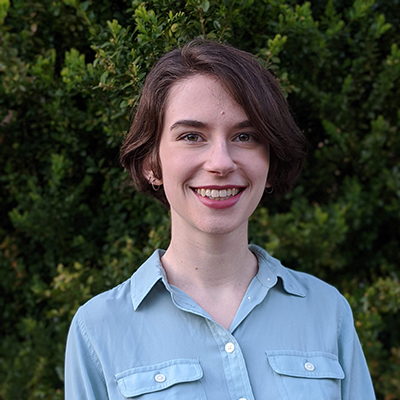
Marissa Fink
BA in Environmental Science and Music. Holmdel, NJTitle:
Shuchat Arts Fellowship: Brass Quintet Performance
I want to thank the Willamette University music department and especially Dr.Willamette’s music department has become a second home to me. As a trombone player and vocalist, I have been fortunate enough to participate in the Willamette Jazz Collective, Willamette Singers, Jazz Combo, University Chamber Orchestra, and Wind Ensemble. I will be forever grateful to the music department faculty and staff, who inspired me to have confidence in my work and to keep doing what I love to do.
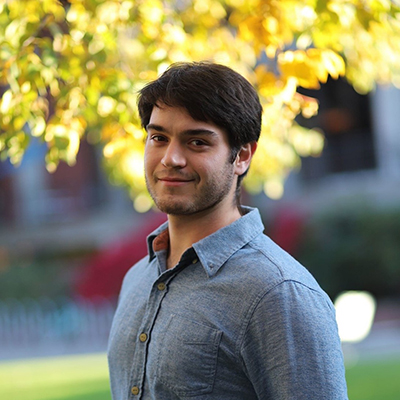
Ethan Frank
BA in Music and BA in Chemistry. Arcata, CATitle: Sonata Pathétique by Ludwig van Beethoven
Music has always been a profoundly expressive, unifying experience to me. In addition to my BA in Music, I am also graduating with a BA in Chemistry, but I could not have done one without the other, especially not Chemistry without Music to balance my time and remind me of why life is so exceptionally beautiful. In my four years of studying music, whether classical with Dr. Coen, Jazz with Miley and Snow, or choral elaborations of both with Dr. Long, and just a twinge of scientific influence too, I have come to learn more and more all of the dynamic ways in which the power of music can be felt and appreciated, and I believe that nothing has the power to bring people together like this art form.
Let me explain some of why I think this is. Sound is vibration, and all things vibrate at a fundamental atomic level, but how can an object or entity create a vibrating sound that is deemed as musical, and how can two vibrational entities share in the recognition of such an occurrence? First off, the necessary quality for vibrations in the air, or noise, to be audible is the size of the vibrational wavelength (amplitude) that it creates. If something vibrates with sufficient amplitude to create a sound, the necessary quality for these audible waves to be then "musical" -- and not just a simple thunk that dies away quickly without pitch -- is the repetitious frequency. So air-wave amplitude = volume, and air-wave frequency = pitch. Musical vibrations have the special quality of generating sound waves which are distinctly repetitious and congruent with those produced a micro-second before, creating a uniform frequency, separating them from the non-repetitious vibrations of non-musical noise. If we hear a pitch as musical it is because the repetitious vibrations of that noise maintain a specific, recurring frequency (like the note A4 which vibrates at 440 Hz and is the standard for Western musical tuning). This phenomenon of musical pitch works the same with the thuds and thunks of percussion as well, the qualifying "musical" factor being repetition of the sound. A stomp or a clap we hear might just be discarded in our ears as someone trying to squash a bug, but when that stomp and clap is repeated for a second time, then suddenly a musical switch is clicked on that registers the second iteration of sound waves as part of a pattern, and we internally latch on to this sound and appreciate it for something intentional, and not a random outburst.
Willamette Music has helped me understand two things that happen when a repetitious vibration has been internalized and a musical structure is established. First, once an established pattern exists and we have entered the musical realm, the pattern can be played and now manipulated to create harmony or dissonance depending on the way the new vibrational frequency overlaps with what was established prior. Only by establishing a strong grounding point can the music grow and develop into something more beautiful and insightful. This is the way life goes, and on the precipice of entering the great void of future adult life, I am grateful for the stable structure and education the music department has provided me with, specifically the ample areas of diversity and structure breaking (like grounding myself at the Oregon Symphony one night, and then being radically inspired by Professor Nord's free jazz concert the next) that has allowed me to have a dynamic and enriching experience thus far, and hopefully continuing outwards. The second thing I've come to appreciate most about repeated musical structures, and my experience in this department, is that in-sync structures, like musical pitches, are necessary for people to connect with each other. Just as a vibrational structure must be established for the music to flourish, so must a shared musical structure be necessary for distinct individuals, operating with their own vibrations (thoughts, feelings, arrangements of molecules), to "sync-up" and share in a connected experience. In this era where we find ourselves in unprecedented distance and isolation, meaningful connection is all the more important, thus I am tremendously thankful for this musical education which has given me one of the most powerful tools for engaging in a collective experience with others, that is to find a groove and help people connect more through music.
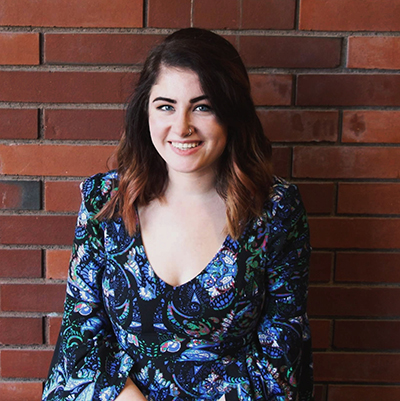
Becca Sullivan
BA in Sociology; Minor in Music. Acton, MATitle: "The Story" by Brandi Carlile. with Marissa Fink and Peter McCabe
My time in the music department has been shorter than many of my peers, because despite a history of loving choir, I chose not to enroll in any ensembles for my first year and a half at Willamette. My musical career really changed when Dr. Long took a chance on me and offered me a spot in the Willamette Singers. His guidance and encouragement helped me to become a much stronger singer and performer. Since then, I have performed with Willamette Singers and Chamber Choir for two years, while serving as the musical director of Willamette's coed a cappella group, Tandem.
While working with this department, I have found the most wonderful friendships and place to call home. It has been so special to learn and perform here. In this video, I perform The Story by Brandi Carlile alongside Marissa Fink and Peter McCabe. This song felt like an appropriate way to wrap up senior year as it is about appreciating the special connections we make in life, like those I've found in the Music Department.
It felt only right to include Peter and Marissa in my final performance, as they have both been so important to me during time at Willamette. Marissa and I have been friends since the first day of college, and we performed together for the first time only a few weeks into the first semester. She and I have played music together for all four years of college as the duo band Icecream Soup. The time I've spent with her has included some of the best moments of my life. Peter has been my rock for the last two years. Ever since I joined the Willamette Singers, and we were put next to each other in our performance standing order, he has been my very best friend. I'm so happy to share this performance with the two of them and all of you.
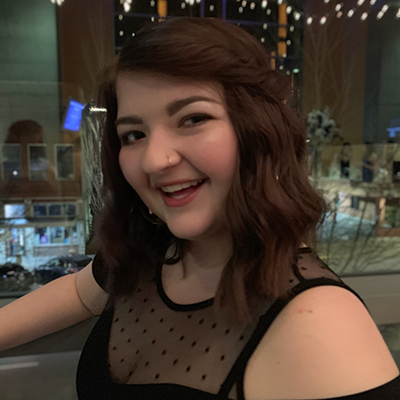
Gabby Wagstaff
Gabby Wagstaff. BA in Psychology; Minor in Music. Denver, COTitle: "Think of Me" by Andrew Lloyd Webber. with Cindy Wagstaff, piano.
In her time at Willamette, Gabby has been a part of Willamette’s Chamber Choir, the Willamette Singers, and the Dramatic Vocal Arts program on campus. She has sung in many ensembles, as well as musicals and operas throughout her life in music. She began private voice lessons at a young age and has always felt it to be an incredibly influential part of her life. Gabby is so very thankful for her family and close friends as they have always encouraged her to achieve whatever she puts her mind to. She would also like to thank Professor Engbretson, Doctor Long, and Professor Strömmer for guiding her during her college musical pursuits as well as being strong examples of excellent people. Next Fall, Gabby will continue her journey at Willamette’s Atkinson School of Business, graduating with her BA and MBA by Spring 2021. She is excited for what her next academic adventure will bring.

